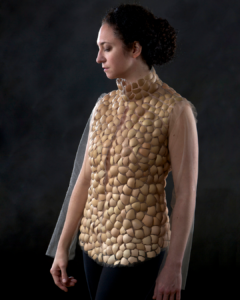
Justin Favela has always seen nachos as work of art.
“The endless combinations of ingredients, the textures, the history and the debate of the best and most original nachos make the dish a conversation piece and catalyst for conversations about belonging and authenticity,” he writes on the text panel for his piñata-inspired sculpture “Floor Nachos Supreme.”
This is the largest of more than a half-dozen sculptures Favela has served up in his Tex-Mex-inspired show “All You Can Eat” at the Houston Center for Contemporary Craft. There’s more work to come from him in January at Art League Houston, where he will be part of the group show “Piñataesthetic.”
Judging from the pictures of wall-filling vignettes and low-rider pinata sculptures on his website, the food-inspired objects look fairly simple. Favela,who lives in Las Vegas, Nevada, works with local communities to build his pieces, covering armatures made of simple materials such as cardboard, styrofoam and chicken wire with strips of paper known as papel china (piñatas originated in China before they were brought to Mexico in the 17th century).
For viewers, the meat of the show lies in the labels for each piece, which share a little bit of food history. Nachos Especiale, for example, were named for their creator, Ignacio “Nacho” Anaya. At the Victory Club in the remote town of Piedras Negras, Mexico, just across the Rio Grande from Eagle Pass, he apparently satisfied American tourists who wanted fried tortillas with a simple concoction of tortillas, cheese and jalapeños. Favela’s “Floor Nachos Supreme” is more loaded, with black beans, diced tomato, cilantro and guacamole added to the basics.
Favela has also concocted a pile of papery chile con carne, a combo platter, a margarita machine, a puffy taco and fajitas (the artist largely credits the late Houston legend Ninfa Laurenzo with creating that craze, starting with her tacos al carbon). The piñata food doesn’t look real, or all that appetizing, actually.
Which may be part of the point. Curator Kathryn Hall suggests that Favela’s works shed an absurdist light on the often-overused term “authentic” to describe Tex-Mex cuisine. However you slice them, they are a calorie-free indulgence.
“All You Can Eat” is on view through Sept. 1 at Houston Center for Contemporary Craft, 4848 Main; free; 713-529-4848, crafthouston.org.
molly.glentzer@chron.com


